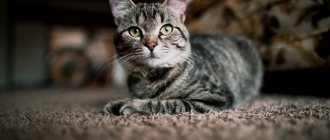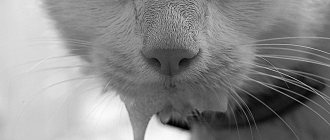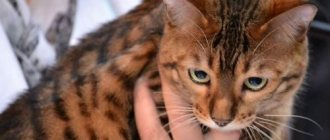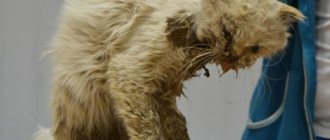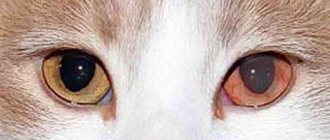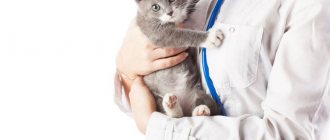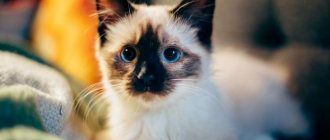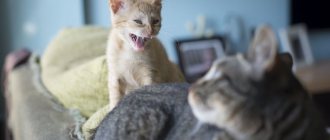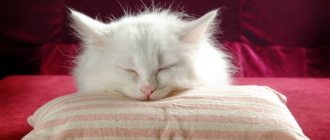- Posted by Olesya Vakhraneva
- Date: November 12, 2018
Drooling in a cat can occur either as a normal physiological reaction or as a symptom of a fatal infection. In order for the owner to act correctly in a specific situation, one should be aware of the reasons that can cause this symptom.
- 2 Conditions for which increased salivation is normal
2.1 Video: causes of drooling in cats
- 3.1 When to urgently contact a veterinarian
- 4.1 Video: a cat is drooling - what to do
How does hypersalivation manifest?
Normal salivation in cats is called salivation, and increased salivation is called hypersalivation. If there is a deviation from the norm, you need to pay attention to the accompanying symptoms.
Normal salivation
First of all, saliva is needed to moisten the food being absorbed. Severe drooling is observed in cats eating dry food. This is absolutely normal. Saliva moistens the dry granules, making them easier to swallow and pass through the esophagus. It also performs a protective function: it disinfects swallowed pieces of food, prevents damage to tooth enamel and oral mucosa.
Hypersalivation in a kitten occurs when baby teeth erupt. With the advent of a full combat set, it stops by itself.
With normal drooling in cats, the fur around the mouth becomes slightly wet. If saliva drips constantly, worsening the quality of the coat, and its volume gradually increases, consult a doctor. This situation requires mandatory diagnosis.
Abnormal salivation
In addition to the deterioration in the quality of fur on the face, neck and chest, the owner should be alert to other alarming symptoms:
- the formation of wet marks in the place where the pet sleeps;
- the tongue falling out of the mouth, which occurs due to its lethargy;
- increasing the number of daily washes;
- making frequent swallowing movements.
In the presence of pathology, hypersalivation is complemented by concomitant symptoms. The patient's appetite decreases, apathy or increased excitability appears. If the condition worsens, gastrointestinal disorders (vomiting, diarrhea), fever and cough may occur.
Heatstroke
Flat-faced cats, such as Persians, have a higher risk of heatstroke, which can cause drooling. Although heatstroke is not as common in cats, too much time in the sun or not drinking enough water can have detrimental effects.
Cats love the sun. Always have fresh, clean water on hand. In the summer, make sure your cat has shady places to cool off. Keep your cat indoors on hot days. Never leave a cat in a parked car. Limit training and play time to keep your cat from overheating.
Causes not related to illness
The causes of increased salivation in a cat are not related to breed. Hypersalivation occurs not only in purebred pets, but also in mixed breeds. In most cases, it is explained by physiology and does not require treatment.
Taking a bitter medicine or licking a chemical substance
When taking bitters orally, an unpleasant taste occurs in the mouth, accompanied by slight numbness. In an attempt to get rid of bitterness, the salivary glands begin to work in enhanced mode. The amount of fluid released and the duration of its flow are individual. On average, the process takes no more than 20 minutes. With long-term use of medications, hypersalivation occurs not only after swallowing the substance, but also shortly before.
It is better to avoid licking chemicals. In this case, excessive salivation is the most favorable outcome. Frequent contact with household chemicals or other hazardous substances can result in serious intoxication.
If your pet licks a package of toilet cleaner right in front of your eyes, then most likely nothing will happen to him. To be safe, watch him for a while and be sure to hide the chemical away from his eyes and agile paws.
Motion sickness while traveling
Animals, like people, are not immune to motion sickness in transport. In addition to increased salivation, nausea and vomiting may occur during the trip. All of the above symptoms disappear on their own at the end of the trip.
Anesthesia
The work of the salivary glands slows down during natural sleep and similar conditions caused artificially. Soon after waking up from anesthesia, the animal experiences increased production of saliva. After replenishing the required volume of fluid, the work of the glands returns to their usual rhythm.
Great hunger
If a cat drools regularly, then the reason for this phenomenon is quite simple. When feeding hourly, the animal's biological clock signals that food is about to be taken. The feeling of hunger intensifies, and a thin stream of saliva appears from the mouth.
Try to avoid taking too long breaks, as real hunger stimulates the production of gastric juice. Due to increased acidity, your pet may develop erosion or ulcers.
Excess of affection
Hypersalivation is typical for affectionate pets that “melt” under the owner’s stroking. When reaching maximum pleasure, they not only purr loudly, but also drool. Most often, this feature is found in sphinxes and orientals.
Foreign object in teeth
The cause of excessive salivation in a cat may be a foreign object stuck in the teeth. If your pet constantly licks itself, carefully examine its oral cavity. In the absence of an abscess and inflammation, a stuck bone, piece of food or other foreign object can be removed with ordinary tweezers.
If there is a decrease in appetite, frequent coughing or vomiting, it is better to consult a veterinarian. The appearance of blood, the main symptom of internal damage, is especially dangerous. Surgery may be required to save the cat.
Old age
With age, bones become more fragile. First of all, this affects the teeth. They wear out and fall out faster. Because of this, the gums are more vulnerable and are often affected by pathogens. To prevent the inflammatory process, the salivary glands begin to work in enhanced mode.
Cats over 12 years old often suffer from caries, gingivitis and periodontal disease. To maintain the health of their teeth, it is necessary to regularly maintain oral hygiene and undergo a preventive examination at the veterinary clinic at least 2 times a year.
Adviсe
Here are a few tips that you need to know and, if possible, follow if you want to return your pet's saliva production to normal :
- the very first thing is to hide all substances, drugs and preparations that are dangerous to its health in a place inaccessible to the cat;
- give more fluid so that the animal’s metabolism is activated and there is no dehydration;
- Products should be introduced into the cat’s diet gradually, starting only with liquid food;
- In order not to aggravate the situation and avoid its recurrence, carefully monitor what you feed your cat: you should not give it bony fish or food that may contain small hard pieces;
- if there is any damage to the oral cavity, it must be promptly treated with disinfectants;
- When treating your pet's fur for fleas and ticks, put a bandage on the cat's neck to prevent the cat from licking the preparation from the fur.
If salivation decreases, the amount of saliva gradually returns to normal, then all the doctor’s recommendations are being followed, and your pet is on the mend.
Pathological causes
It is worth thinking about pathology if hypersalivation occurs at different times of the day and lasts more than 2 hours with a stable increase in saliva volume. Based on the accompanying symptoms, you should try to make a preliminary diagnosis yourself, since one of the possible causes is fatal to humans.
Virus: rabies, calcivirosis, rhinotracheitis
Drooling in cats occurs when infected with viruses. Depending on the symptoms, the pet may be infected:
- Rabies
. The most dangerous infection, accompanied by behavioral changes, photophobia and hydrophobia. If the disease occurs in a violent form, then the infected person can attack the owner. Any bite or scratch received from a carrier of the virus is deadly. Before the veterinarian arrives, be sure to isolate the cat in a separate room and do not come into contact with it.
- Calcivirus
. Severely weakens the body. Accompanied by vomiting, inflammation of the conjunctiva, stomatitis and damage to the respiratory system. May cause lameness and pneumonia. Treatment of the disease comes down to preventing secondary infection, which increases the likelihood of death to 80%. Additionally, symptomatic therapy is carried out to increase the immune response. As a result, the body destroys the virus on its own.
- Rhinotracheitis
. Causes depression and loss of appetite. The patient's temperature rises, rhinitis, cough and shortness of breath appear. Discharge from the eyes and nose may contain pus. Treatment is carried out by analogy with calcivirus. Without timely treatment, the disease develops into a chronic form. After recovery, 80% of whiskered patients remain carriers of the virus, so it is important to prevent them from coming into contact with other animals.
Please note that there is no cure for rabies. The only way to help a mustachioed pet is to prevent it from becoming infected. Preventive recommendations and vaccination will help with this.
Oncology – leukemia
Leukemia, or blood cancer, is a deadly pathology of the hematopoietic system. As a result of the proliferation of tumor tissue, healthy cells are replaced by malignant ones. The patient's immunity is suppressed, increasing the body's vulnerability.
The main danger of this disease is the absence of external signs. Blood cancer can be detected only by symptoms of secondary infections. The oral cavity is most often affected. The animal develops gingivitis and stomatitis, accompanied by abundant salivation.
Despite the lack of effective treatment, timely therapy prolongs the patient's life while maintaining his quality of life. In addition to a special diet, veterinarians use antibiotics, antiviral drugs and immunomodulators. In severe cases, a blood transfusion is required.
The cat is about to vomit fur
Periodic hair shedding is a natural process. Some owners specifically give their pets fresh grass that stimulates the gag reflex. As a result of burping, small balls of hair, or trichobezoars, come out of the cat's mouth.
Pathology is indicated when hairballs accumulate in the intestines. The resulting mass blocks the passage of feces, causing constipation, vomiting of undigested pieces of food and profuse salivation. Without timely help, the animal may die from rupture of the intestinal walls.
For treatment, medications are used that dissolve accumulated hairs and a special diet that normalizes digestion. Surgery is resorted to only in case of intestinal obstruction, when any stimulation of peristalsis is lethal for the patient.
Poisoning and nausea
Drooling, accompanied by frequent vomiting and diarrhea, is often associated with poisoning. Ingesting spoiled food, cleaning products, human medicines, or toxic plants can cause laryngeal muscles to spasm. If your cat's breathing is interrupted and his heartbeat increases, take him to the veterinary clinic immediately. Acute poisoning can be fatal.
To remove toxins, rinsing is used, but in case of poisoning, an antidote must first be administered. Otherwise, the condition of the mustachioed patient will worsen. After toxins are removed, the animal is prescribed infusion therapy and a gentle diet.
Oral diseases
With untreated caries, the animal develops gingivitis, that is, inflammation of the gums. In addition to increased work of the salivary glands, this pathology is accompanied by severe redness of the gums. An unpleasant odor may also appear.
Another possible cause of hypersalivation is a mucocele, or salivary gland cyst. With this disease, a blockage occurs in the duct of the salivary glands. The accumulating fluid leads to severe swelling.
Oral diseases left untreated can lead to tooth loss. Depending on the diagnosis, the veterinarian prescribes antibiotics, anti-inflammatory drugs, pain-relieving gels, or more radical methods of therapy. In advanced cases, diseased teeth are removed. This operation is performed under general anesthesia.
Infection with worms
The cat drools even with helminthiases. Infection is accompanied by loss of appetite and weight, bloating and hardening of the abdomen. Helminth waste products cause severe intoxication. The body uses vomiting and diarrhea to get rid of harmful substances. These symptoms are very dangerous for kittens - they can die due to dehydration.
Anthelmintic drugs are used for treatment. The medicine is given twice, as it does not affect the parasite eggs. Repeated administration of the anthelmintic kills the hatched larvae, preventing the next laying of eggs.
Allergy
Allergic reactions are accompanied by itching, redness of the skin, rhinitis and cough. Frequent interaction with an allergen is fraught with the development of bronchial asthma. It is better to show an animal with suspected allergies to a veterinarian. Antihistamines are used to suppress the effect of the allergen.
Gastrointestinal pathologies
If your cat is drooling, mucous membranes have turned yellow, vomiting and diarrhea have appeared - pay attention to inclusions in the feces and vomit. The presence of foreign inclusions (blood, mucus, pieces of undigested food) and a putrid odor from the mouth are the main symptoms of gastrointestinal pathologies: enteritis, pancreatitis, gastritis, colitis. All these diseases are dangerous not only due to dehydration, but also due to the failure of the diseased organ.
The type of therapy depends on the diagnosis, but in all cases it is recommended to follow a therapeutic diet. If necrosis is detected, surgery is performed to remove damaged tissue.
Reaction to stress
Prolonged nervous tension reduces the body's defenses, exacerbating chronic diseases and increasing susceptibility to infections. It is caused by travel in transport, visits to the veterinary clinic, moving and other alarming events for the animal. In addition to drooling, stress is accompanied by slight trembling, restlessness, active licking and avoidance of contact with the owners.
In addition to eliminating the irritating factor, veterinarians recommend calming medications with pheromones. They are produced in the form of drops, collars and diffusers with replaceable bottles.
What should the owner do?
Possible actions on the part of the owner depend on the condition of the animal. If it is healthy, and all the signs of a physiological cause are present, the problem that has arisen will resolve itself.
If you are prone to motion sickness in transport, consult your veterinarian to select tablets. Give them to your cat before every trip.
An object stuck in the teeth should be carefully removed with tweezers. After manipulation, treat the mucous membranes with Miramistin or chlorhexidine to avoid infection. If the foreign body is deeply located, it is better not to take independent actions, since any mistake can lead to injuries to the larynx.
In all other cases, it is recommended to immediately contact a veterinarian. Remember that when infected with certain viruses and helminths, a cat becomes dangerous to humans.
Diagnosis
The cat must be shown to a veterinarian if you cannot independently determine the cause of hypersalivation. The doctor will examine your pet's mouth to rule out or confirm the presence of inflammation in the mouth. If they are not there, you will have to examine the animal more carefully.
The clinic will conduct the following studies:
- A general analysis of blood, urine, and feces for worm eggs.
- If trichobezoars are suspected, an x-ray or ultrasound of the peritoneal organs will be performed. These studies can also help identify neoplasms.
In what cases does an animal require treatment?
Treatment is required for any pathological cause, since self-healing is an extremely rare phenomenon. To determine the necessary medications, the pet will have to undergo tests and undergo all examinations recommended by the doctor.
Do not delay contacting the veterinary clinic if alarming symptoms are detected. Timely treatment begins significantly reduces the risk of developing possible complications.
Sore throat and pharyngitis: what is the difference?
The general condition of the patient with acute tonsillitis or tonsillitis can be confused with the symptoms of pharyngitis. If the disease is diagnosed incorrectly, then treatment of pharyngitis in adults will not have any effect. And the acute form of the pathology can develop into a chronic one.
Unfortunately, many patients self-medicate and start using medications without a doctor’s specific prescription. This is extremely contraindicated! It is better to take care of your health in time and seek help from an experienced otolaryngologist.
It is important to remember that during pharyngitis, the larynx becomes inflamed, and during tonsillitis, the tonsils become inflamed. During a sore throat, it is always painful to swallow, and the pain intensifies even more when eating food. With pharyngitis, the opposite happens - while eating warm food or warm drinks, the sore throat decreases.
During the development of a sore throat, there is no cough or sore throat, only a sore throat and sometimes the formation of a white coating. With pharyngitis, there is a sore throat, as well as noise, pain, or congestion in the ears. The difficulty in distinguishing between these two diseases is further complicated by the fact that one patient can simultaneously develop both pathologies, since they are caused by the same pathogen.
